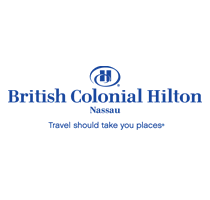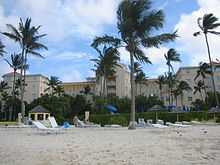British Colonial Hilton Nassau
| British Colonial Hilton Nassau | |
|---|---|
 | |
 | |
| General information | |
| Location | 1 W Bay St, Nassau, Bahamas |
| Coordinates | 25°4′42″N 77°20′44″W / 25.07833°N 77.34556°W |
| Opening | 1923, 1999 |
| Technical details | |
| Floor count | 7 |
| Other information | |
| Number of rooms | 288 |
| Number of suites | 20 |
| Website | |
| www.hiltoncaribbean.com | |
The British Colonial Hilton Nassau is a luxury five-star or AAA four-diamond colonial hotel in downtown Nassau, Bahamas, located on the only private beach in Nassau, on the site of the Old Fort of Nassau, near the Christ Church Cathedral and the Greek Orthodox Church. The hotel, originally opened in 1923, is located in a grand colonial building and has been described as "the Grand Dame of all Nassau hotels",[1] "the most elegant and most expensive hotel in town",[2] and "the most distinctive and pleasant of the island's large hotels".[3]
History of the area
The site was occupied in the 19th century by the Old Fort of Nassau to protect the western entrance to the Nassau Harbour until it was demolished in 1873.[4] Long before the fort was built, the first settlement was established here in 1666, when Nassau was known as Charles town, which had developed in a haphazard manner lined with brothels and taverns visited by pirates, cheats and vagabonds. The presence of pirates in the town caused attacks by Spaniards when the town people fled to American colonies. The town was rebuilt later with a fort and called Nassau, on the site now occupied by the Hotel. The town was attacked again in 1703 by the allied forces of the French and the Spanish who destroyed the fort. Piracy was decimated when the British Governor Woodes Rogers took over in 1718. Over the next two centuries, the town developed under American influence during the 18th and 19th century witnessing glamour and many buildings of architectural excellence being built with slave labour. It was not until the Greeks came in the 20th century to man the sponging industry that rich started frequenting the island. Prohibition in USA encouraged at that time (Civil war period) the GIs and tourist to visit the island for hooch. It was during this period that major hotels started coming up like the British Colonial Hotel and Fort Montagu, which initially operated for three months during the winter season till the Washington Ball was celebrated.[5]
Hotel history
In 1900, the land was purchased by Henry M. Flagler, responsible for the Breakers Hotel in South Florida. He built an enormous wooden hotel on the site, the Colonial Hotel, which opened in 1901.[4] In 1922 the hotel was gutted by fire. The government purchased the land and the New Colonial Hotel,[6] a new seven-story grand hotel, was built on the site within six months and completed in 1923.
In 1939, the hotel was purchased by Sir Harry Oakes, along with the Nassau Airport and golf course.[4] Oakes renamed the hotel the British Colonial Hotel. He was a powerful man and a friend of the Duke of Windsor.[4][7][8][9] He was later murdered in 1943 under mysterious circumstances (the mystery remains unresolved), which was called the "murder of the century".[10]
The hotel became part of Sheraton Hotels in the 1960s and was renamed the Sheraton British Colonial. Sheraton operated the hotel until 1989, when it became part of Best Western Hotels as the British Colonial Beach Resort. The old hotel building was gradually closed up over the course of the 1990s, with rooms eventually operating in only a small portion of the complex. Finally, in 1997 it was purchased by RHK, who renovated it at a cost of over $90 million.[11] They completely gutted and modernized the interiors, but retained its iconic façade of towers, galleries, and molded reliefs. Since the hotel reopened in 1999 it has been managed by Hilton Hotels as the British Colonial HIlton Nassau.
Interior

On one side of the hotel is a tropical garden and the pool overlooking the harbor. The main restaurants are Aqua, serving international cuisine and Portofino serving Italian-Caribbean fusion cuisine, and the Bullion Bar serves drinks and snacks.[12] The lobby is luxurious, with marble titles and antiques and features the Blackbeard’s Cove Lobby bar and nightly Bahamian/Caribbean music. All of the rooms are decorated in colonial décor. A relief depicting Christopher Colombus is situated high on the grand central tower of the hotel, and at the front of the hotel is a statue of Woodes Rogers, the ex-privateer who proved effective against piracy in the area.[4] A mural depicting the history of the Bahamas was added in 1999 to the entrance hall.[4]
Facilities
The hotel was renovated in June 2009 at a cost of US$ 15 million,[13] has six floors spread over an 8-acre plot and has 288 guest rooms, 20 suites and 47 executive-level rooms. It has a 300-foot-long private white sand beach which features complimentary kayaking and snorkeling.[12][14] The hotel has been fully modernised with new electronics and furnishings. The executive lounge is located on the top floor provided with 18,400 feet (5,600 m) of space.[13]
James Bond
The hotel was used as a filming location for the James Bond films Thunderball (1965) and Never Say Never Again (1983 unofficial remake) both starring Sean Connery.[1] The scene in Never Say Never Again where the character of Fatima Blush (Barbara Carrera) (not actually Kim Bassinger as the source says) is waterskiing was shot in front of the resort and where she skis onto the end of the pier into James Bond's arms is the hotel’s old gazebo bar (located on the left of the picture in the infobox). The pier was especially built for the movie Never Say Never Again, and the hotel wanted to keep it.[4]
References
- ↑ 1.0 1.1 Porter, Darwin; Prince, Danforth (10 November 2006). Bahamas For Dummies. For Dummies. p. 138. ISBN 978-0-471-96250-2. Retrieved 24 April 2011.
- ↑ Agate, Nicky; Guides, Rough (29 October 2002). Rough guide to the Caribbean. Rough Guides. p. 70. ISBN 978-1-85828-895-6. Retrieved 24 April 2011.
- ↑ Henderson, James (1 October 2005). Caribbean & the Bahamas. New Holland Publishers. p. 791. ISBN 978-1-86011-212-6. Retrieved 24 April 2011.
- ↑ 4.0 4.1 4.2 4.3 4.4 4.5 4.6 "James Bond's British Colonial Hilton Nassau". Tourism Review. Retrieved 24 April 2011.
- ↑ Christopher P. Baker (April 2001). Bahamas, Turks & Caicos. Lonely Planet. pp. 143–. ISBN 978-1-86450-199-5. Retrieved 25 April 2011.
- ↑ http://books.google.com/books?id=POYoiwitVTcC&pg=PA45&lpg=PA45&dq=colonial+hotel+nassau+opened+1923&source=bl&ots=MP6eWiwOeY&sig=V5Zh586qr6BepAbLWMI2yRoPyEk&hl=en&sa=X&ei=ovqLUp2EH5Wr4AOLzoHwAQ&ved=0CEYQ6AEwBA#v=onepage&q=colonial%20hotel%20nassau%20opened%201923&f=false
- ↑ Michelin Tire Corporation; Michelin Travel Publications (Firm) (1 January 2007). Michelin Florida. Michelin Travel Publications. Retrieved 25 April 2011.
- ↑ Darwin Porter; Danforth Prince (17 August 2007). Frommer's Bahamas 2008. Frommer's. pp. 111–. ISBN 978-0-470-14568-5. Retrieved 25 April 2011.
- ↑ Lakeside Publishing Co. (March 2005). Cruise Travel. Lakeside Publishing Co. pp. 8–10. ISSN 0199-5111. Retrieved 25 April 2011.
- ↑ Danforth Prince; Darwin Porter (30 August 2010). Frommer's Bahamas 2011. Frommer's. pp. 109–. ISBN 978-0-470-61437-2. Retrieved 25 April 2011.
- ↑ http://www.airlinesanddestinations.com/destinations/revitalizing-downtown-nassau/
- ↑ 12.0 12.1 "Facilities". Hilton Hotels. Retrieved 24 April 2011.
- ↑ 13.0 13.1 "British Colonial Hilton Nassau Announces $15 Million Dollar Makeover". Hilton.com. Retrieved 25 April 2011.
- ↑ "Bahamas vacations are better at the Hilton". Bahama-Hotels.com. Retrieved 25 April 2011.